-
NK, currently with 13-30 nukes, is expanding its arsenal by 3-5 weapons per year
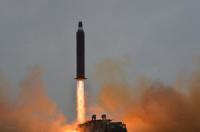
As of the end of 2016, North Korea is estimated to have 33 kilograms of separated plutonium and between 175 and 645 kilograms of weapon-grade uranium. If North Korea would use 70 percent of its estimated stock of weapon-grade uranium and plutonium to produce nuclear weapons, it would have between 13 and 30 such weapons, depending on their yield. David Albright of the Institute for Science and International Security says that based on this cumulative estimate, North Korea is currently expanding its nuclear weapons at a rate of about 3-5 weapons per year.
-
-
Service Academies Swarm Challenge: Controlling drone swarms
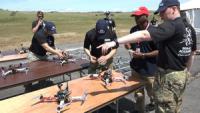
UAVs and other robots have become increasingly affordable, capable, and available to both the U.S. military and adversaries alike. Enabling UAVs and similar assets to perform useful tasks under human supervision — that is, carrying out swarm tactics in concert with human teammates — holds tremendous promise to extend the advantages U.S. soldiers have in field operations. A persistent challenge in achieving this capability, however, has been scalability: enabling one operator to oversee multiple robotic platforms and have them perform highly autonomous behaviors without direct teleoperation. To help make effective swarm tactics a reality, DARPA created the Service Academies Swarm Challenge, a collaboration between the Agency and the three U.S. military Service academies.
-
-
Explosions rock Damascus Airport following cargo flights from Iran
Explosions rocked the area near Damascus International Airport early Thursday morning following the arrival of four cargo planes from Iran. Israeli leaders have said that Hezbollah receiving game-changing weapons, such as advanced missiles or chemical weapons, represents a “red line” that Israel will not accept.
-
-
DHS launches new Office for victims of illegal immigrant crime
Homeland Security secretary John Kelly the other day announced the official launch of the U.S. Immigration and Customs Enforcement (ICE) Victims of Immigration Crime Engagement Office (VOICE). The VOICE office will assist victims of crimes committed by criminal aliens. ICE built the VOICE office in response to the Executive Order entitled Enhancing Public Safety in the Interior of the United States, which directed DHS to create an office to support victims of crimes committed by criminal aliens.
-
-
Germany: Rise in crimes committed by foreigners -- and in crimes by right-wing extremists
Earlier this week Germany’s Interior Ministry released the 2016 police crime statistics, including statistics of politically motivated crime. Compared to 2015, the number is up by 6.6 percent and has reached a new high. The main factor is the soaring number of politically motivated crimes by foreigners, which has risen by 66.5 percent to a total of 3,372 offenses. The backlash against the large number of migrants allowed into Germany in 2015 and 2016 manifests itself in crime statistics as well: While the number violent offenses motivated by left-wing extremism fell by 24.2 percent, the number of violent offences committed by right-wing extremists rose by 14.3 percent.
-
-
New tool for first responders: An ice bag to the face
A new study suggests a simple bag of ice water applied to the face could help maintain adequate blood pressure in people who have suffered significant blood loss. the researchers’ aim is to help prevent cardiovascular decompensation, a sudden precipitous drop in blood pressure that limits oxygen delivery to the heart, brain, and other vital organs. Decompensation is a significant risk after blood loss, even once the person is no longer actively bleeding.
-
-
Local, federal focus on deadly gang violence on Long Island
There has been a surge since 2014 in the number of unaccompanied minors coming to the United States, mostly from El Salvador, Guatemala, and Honduras. Most of the minors are entitled to federal anti-trafficking protections, and subsequent resettlement. Suffolk Country is ranked fourth in the U.S. in the number of unaccompanied minors resettled in the county, and neighboring Nassau County ranks tenth. Violent gangs such as MS-13 actively recruit these unaccompanied minors. Local and federal leaders say there is a need to do more – from better vetting to gang prevention programs to better law enforcement – to address the growing gang violence.
-
-
Does cooperating with ICE harm local police? What the research says
Police need public cooperation. The police rely on the public to report and help solve crimes. This is especially true now that police departments face budget cuts and increasing demands on their time – an environment that pressures police to get things done through innovative partnerships with citizens. But cooperation and partnerships rely on trust, something that’s in short supply between citizens and police. A tough stance toward enforcing immigration laws can make immigrants, as well as the general public, cynical toward police, weakening their trust and legitimacy. Police are right when they say forcing them to work with ICE will make their job harder.
-
-
World military spending: Increases in the U.S., Europe, decreases in oil-exporting countries
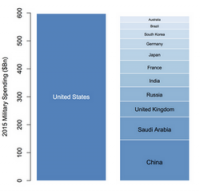
Total world military expenditure rose to $1686 billion in 2016, an increase of 0.4 percent in real terms from 2015, according to new figures from the Stockholm International Peace Research Institute (SIPRI). Military spending in North America saw its first annual increase since 2010, while spending in Western Europe grew for the second consecutive year.
-
-
One in five U.S. gun owners obtained firearm without background check

One in five U.S. gun owners who obtained a firearm in the past two years did so without a background check, according to a new national survey. The study also found the share of gun owners who acquired firearms via private sale without background checks was significantly larger (57 percent) in states without laws regulating such purchases than in states with legislative regulations (26 percent). It has been earlier estimated that 40 percent of gun transfers were conducted without background checks.
-
-
The worry over North Korea
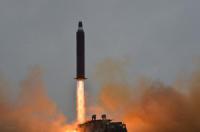
The risk of war on the Korean peninsula is low, says a nuclear arms expert. “Both sides are rattling sabers, but neither side is going to start a war,” says Belfer Center’s Gary Samore. “We recognize that a military attack on North Korea would probably not be effective in terms of destroying North Korea’s nuclear weapons and missile program and would run the risk of a North Korean retaliation against South Korea and Japan, which could cost hundreds of thousands of lives. And the North Koreans know that any attack on U.S. allies in the region would provoke an American response that would destroy them.”
-
-
Eyewitness confidence may predict accuracy of identifications
Many individuals have been falsely accused of a crime based, at least in part, on confident eyewitness identifications, a fact that has bred distrust of eyewitness confidence in the U.S. legal system. But a new report challenges the perception that eyewitness memory is inherently fallible, finding that eyewitness confidence can reliably indicate the accuracy of an identification made under certain, “pristine” conditions.
-
-
France: We have proof Assad ordered chemical attack on Khan Sheikhun

Jean-Marc Ayrault, France’s foreign minister, said Wednesday that France’s intelligence services have evidence that the Syrian government carried out the chemical weapons attack on a Sunni village earlier this month. The Syrian military’s attack on Khan Sheikhun killed eighty-six. British and Turkish scientists, examining injured victims and performing autopsies on those killed, found evidence of both sarin - a nerve gas - and chlorine.
-
-
Syrian defector: Assad still has hundreds of tons of chemical weapons stockpiled
Syrian President Bashar al-Assad circumvented a 2013 deal to dismantle his chemical weapons stockpile by failing to declare the full extent of his arsenal, Syria’s former chemical weapons research chief. Brigadier-General Zaher al-Sakat, who served as the head of chemical warfare in a top Syrian military unit before defecting in 2013, said that Assad had not declared large amounts of sarin and its precursor chemicals.
-
-
German peace-keeping force in Mali hobbled by extreme heat
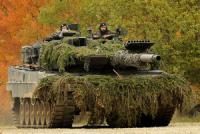
Germany has agreed to support to UN peace keeping mission in Mali, a country facing Islamist insurgency in the vast desert in the country’s north. But there is a problem: The Bundeswehr’s service vehicles were found to be unable to take Mali’s searing heat. Half to ground vehicles Germany shipped to Mali are no longer in operating condition, and the deployment of the sophisticated Tiger helicopter has been delayed because it cannot operate in temperatures which exceed 109 F.
-
More headlines
The long view
Factories First: Winning the Drone War Before It Starts
Wars are won by factories before they are won on the battlefield,Martin C. Feldmann writes, noting that the United States lacks the manufacturing depth for the coming drone age. Rectifying this situation “will take far more than procurement tweaks,” Feldmann writes. “It demands a national-level, wartime-scale industrial mobilization.”
How Male Grievance Fuels Radicalization and Extremist Violence
Social extremism is evolving in reach and form. While traditional racial supremacy ideologies remain, contemporary movements are now often fueled by something more personal and emotionally resonant: male grievance.
The Surprising Reasons Floods and Other Disasters Are Deadlier at Night
It’s not just that it’s dark and people are asleep. Urban sprawl, confirmation bias, and other factors can play a role.
Why Flash Flood Warnings Will Continue to Go Unheeded
Experts say local education and community support are key to conveying risk.
